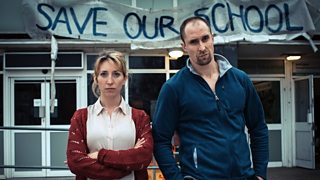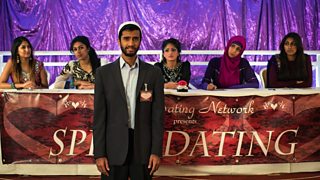Outside the box - original drama shorts on iPlayer
Hilary Salmon
Head of Drama - England, �������� Studios
Tagged with:

Original Drama Shorts on iPlayer: Tag
Next week, a series of special dramas made for �������� iPlayer are made available online. In this post, Executive Producer Hilary Salmon throws light on how �������� Drama Production operates, explains how writers and scripts were selected and the resulting online drama shorts made.��
Why did a strand of three short films by new writers and directors feel like one of the most exciting and challenging new commissions of 2013 for ? After all, the films would be small with low budgets and would 'go out' on �������� iPlayer not on �������� One. It seems a potentially low profile project put like that, but from the beginning that’s the opposite of how we in Drama Production and Victoria Jaye, Head of TV Content for �������� iPlayer, saw the strand.
Original Drama Shorts is a brand new two-year commission for Drama Production and is the first time that we have made authored, original content for online, unconnected to an existing brand. Our brief has been to produce three high quality, short films by new talent specifically for �������� iPlayer. Excitingly for us we were asked to approach up-and-coming writers to pitch their best ideas for a short film which might become shareable content for a young audience. Finding opportunities to work with new writers especially those with a strong or distinctive voice is one of our biggest challenges in Drama especially since single film strands stopped being made on �������� One and �������� Two - in primetime at least - and more recently since the end of all drama (mostly single films) on �������� Four.

Original Drama Shorts on iPlayer: My Jihad
We keep up, of course, with new work in the theatre and elsewhere, we meet and nurture relationships with new writers, and EastEnders and Doctors run shadow schemes specifically to nourish their writing teams, but we rarely get to ask writers that most fundamental of questions: What do you want to write? What’s your story?
So the chance, last May, to invite into the building 30 of the most promising and diverse writers from all over the country to talk about �������� iPlayer and the short film form created an atmosphere of near hysteria on the third and fourth floors of Grafton House. These were writers who were already known to Drama Production or our partners in the search��, but whose ideas we had mostly not yet converted into an on-screen credit. Writers Toby Whithouse and David Levi Addai talked��about their highly successful work and what helped connect with audiences. Humour, optimism, excitement, surprise, strong characters and recognition were big watchwords for both writers and inspired the room into pitching a huge variety of story ideas; there was only one other stipulation, they had to be presented on one sheet of A4.
The resulting ideas represented an insight into the creative zeitgeist for that age group of writers. We had 'Tales from the Unexpected', RomComs, outsiders up against the world, and many ideas that looked at the role that social media plays in shaping young peoples' self-perceptions. Mindful of keeping as much range as possible at this stage we painfully narrowed the ideas down to 10 ‘we have to see what that’s like as a script’ pitches and then went on to develop the scripts with the writers just as we would with any other project. Finally the scripts were as good as we felt they could be in the time and we had to choose the three that would make it through to production. At this stage one other criteria came into play and that was, 'Have we seen this before?' If authorship and originality were key then that question had to finally separate the men from the boys. We selected Flea, by , written entirely in verse, My Jihad, by , a Muslim RomCom and Tag by , set in a school at the end of its life where two teachers are playing a final game of ‘It’.

Original Drama Shorts on iPlayer: Flea
Whilst the script development process was happening another painstaking trawl for talent was being undertaken by our producer, Claire Bennett. It feels like something of a luxury to sit around watching short films all day, but perhaps not when there are 300 of them! Directors 'come up' through a number of quite different routes including: film school, self-taught in production, and theatre but the making of short films tends to be common to most aspiring directors and are a good calling card as they can give a sense of a director's taste as well as their ability with cast and camera. A final shortlist of 10 were sent the three scripts and asked to come in and pitch for their favourite.
Then after six months of preparation, time started to speed up. It was September and we had promised to deliver the films to �������� iPlayer by Christmas. The budget ��for the films was 'challenging' and we realised that the most economical way of making them would be back-to-back, with one design and production team, and from one base. We knew there would be nowhere to go if a scene got dropped or the heavens opened or a failed to turn up or if a bus - that was also the key set - broke down. And there was almost no money for toys… or supporting artists. The directors had to be imaginative about how they used their time and their resources. After nine action-packed, and yes stressful, shooting days we had three films in the can. Claire told me that she was more tired at the end than she had been after the shoot for the third series of Luther��- but just as satisfied. Then came the edit (five days each) and suddenly they were locked, graded and mixed.
Looking back the obvious question to ask is what is the difference between making a programme for the iPlayer and making one for a TV channel? The answer I think mostly is that there isn’t a difference. We still aimed for the highest quality writing, directing and production we could. And we still thought hard about the sensibility of the audience. But then again we don’t get commissioned to make short films by any other channel. And no other platform would say that the final length of each film could vary because there’s no such thing as a slot. And crucially the films needed to be ambitious and extrovert enough to reach an audience where there’s no inheritance, no notion of TV as wallpaper, where the audience needs to choose to press play and, hopefully, to share. It doesn’t come much more exciting and challenging than that.
is Executive Producer, �������� Drama Production.
- Head of TV Content writes about the launch of the new �������� iPlayer
- Read the����on the Media centre
- See��Dan Taylor's post����on the Internet blog
- �������on the TV blog
- Also read blogs from the writers of�������Ի�����on the Writersroom
- See �������� History Manager John Escolme's post contextualising the new content,��.
��
